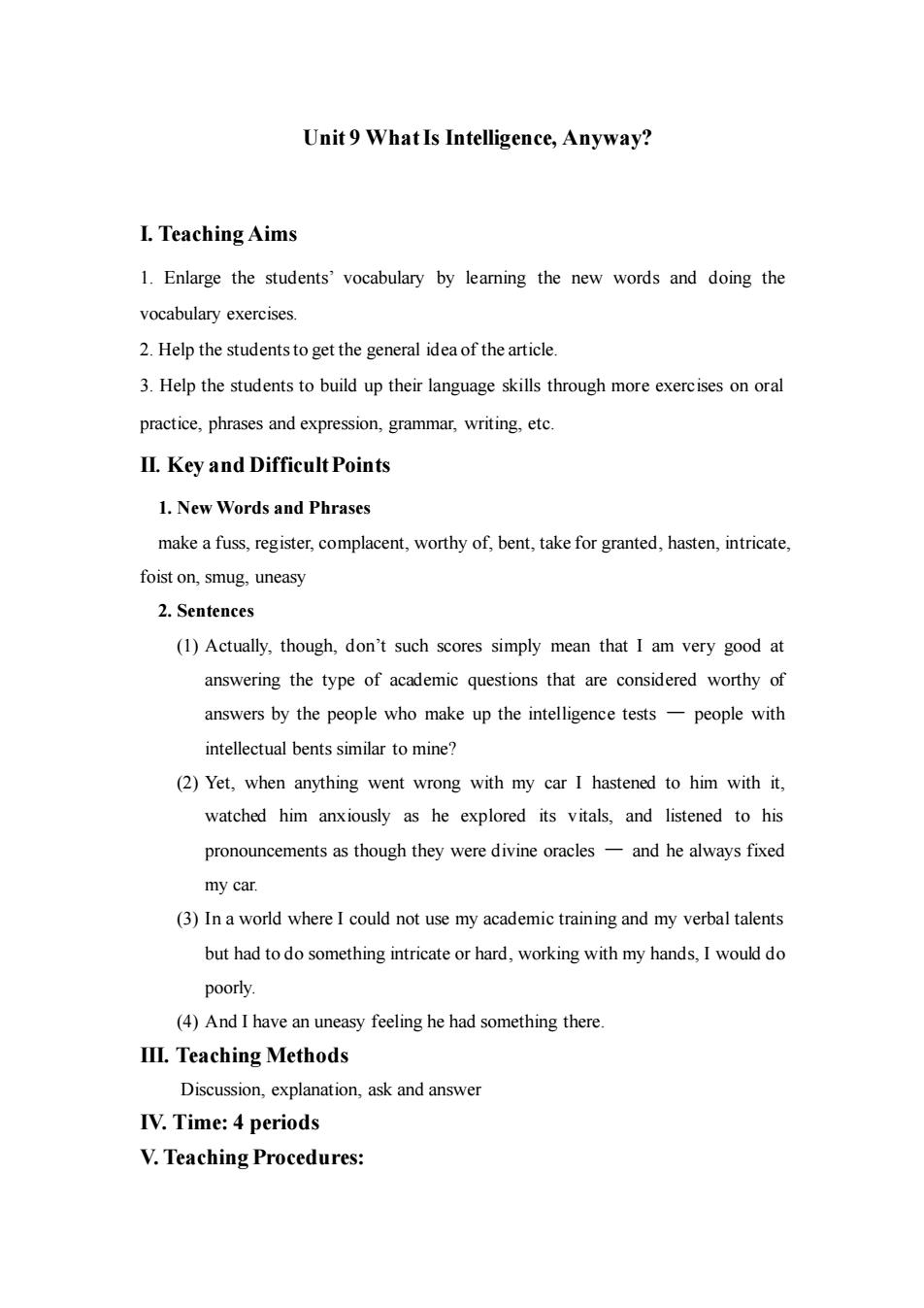
Unit 9 What Is Intelligence,Anyway? I.Teaching Aims 1.Enlarge the students'vocabulary by leaming the new words and doing the vocabulary exercises. 2.Help the studentstoget the general idea of the article 3.Help the students to build up their language skills through more exercises on oral practice,phrases and expression,grammar,writing.etc. II.Key and Difficult Points 1.New Words and Phrases make a fuss,register,complacent,worthy of,bent,take for granted,hasten,intricate, foist on,smug,uneasy 2.Sentences (1)Actually,though,don't such scores simply mean that I am very good at answering the type of academic questions that are considered worthy of answers by the people who make up the intelligence tests-people with intellectual bents similar to mine? (2)Yet,when anything went wrong with my car I hastened to him with it, watched him anxiously as he explored its vitals,and listened to his pronouncements as though they were divine oracles-and he always fixed my car. (3)Ina world where I could not use my academic training and my verbal talents but had to do something intricate or hard,working with my hands,I would do poorly. (4)And I have an uneasy feeling he had something there. III.Teaching Methods Discussion,explanation,ask and answer IV.Time:4 periods V.Teaching Procedures:
Unit 9 What Is Intelligence, Anyway? I. Teaching Aims 1. Enlarge the students’ vocabulary by learning the new words and doing the vocabulary exercises. 2. Help the students to get the general idea of the article. 3. Help the students to build up their language skills through more exercises on oral practice, phrases and expression, grammar, writing, etc. II. Key and Difficult Points 1. New Words and Phrases make a fuss, register, complacent, worthy of, bent, take for granted, hasten, intricate, foist on, smug, uneasy 2. Sentences (1) Actually, though, don’t such scores simply mean that I am very good at answering the type of academic questions that are considered worthy of answers by the people who make up the intelligence tests — people with intellectual bents similar to mine? (2) Yet, when anything went wrong with my car I hastened to him with it, watched him anxiously as he explored its vitals, and listened to his pronouncements as though they were divine oracles — and he always fixed my car. (3) In a world where I could not use my academic training and my verbal talents but had to do something intricate or hard, working with my hands, I would do poorly. (4) And I have an uneasy feeling he had something there. III. Teaching Methods Discussion, explanation, ask and answer IV. Time: 4 periods V. Teaching Procedures:
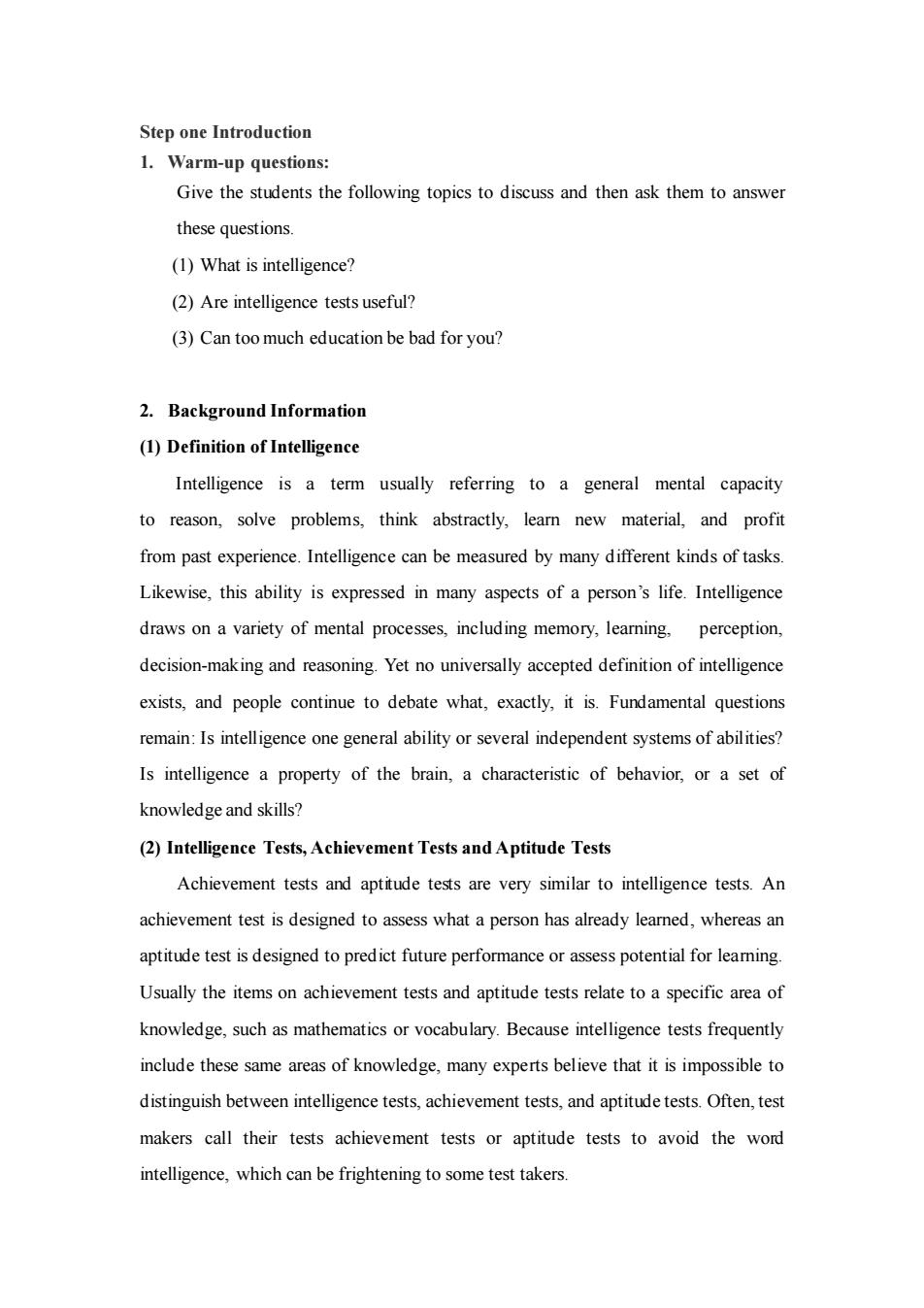
Step one Introduction 1.Warm-up questions Give the students the following topics to discuss and then ask them to answer these questions (1)What is intelligence? (2)Are intelligence tests useful? (3)Can too much education be bad for you? 2.Background Information (1)Definition of Intelligence Intelligence is a term usually referring to a general mental capacity to reason,solve problems,think abstractly,learn new material,and profit from past experience.Intelligence can be measured by many different kinds of tasks. Likewise,this ability is expressed in many aspects of a person's life.Intelligence draws on a variety of mental processes,including memory,learning.perception, decision-making and reasoning.Yet no universally accepted definition of intelligence exists,and people continue to debate what,exactly,it is.Fundamental questions remain:Is intelligence one general ability or several independent systems of abilities? Is intelligence a property of the brain,a characteristic of behavior,or a set of knowledge and skills? (2)Intelligence Tests,Achievement Tests and Aptitude Tests Achievement tests and aptitude tests are very similar to intelligence tests.An achievement test is designed to assess what a person has already leared,whereas an aptitude test is designed to predict future performance or assess potential for leaming. Usually the items on achievement tests and aptitude tests relate toa specific area of knowledge,such as mathematics or vocabulary.Because intelligence tests frequently include these same areas of knowledge,many experts believe that it is impossible to distinguish between intelligence tests,achievement tests,and aptitude tests.Often,test makers call their tests achievement tests or aptitude tests to avoid the word intelligence,which can be frightening to some test takers
Step one Introduction 1. Warm-up questions: Give the students the following topics to discuss and then ask them to answer these questions. (1) What is intelligence? (2) Are intelligence tests useful? (3) Can too much education be bad for you? 2. Background Information (1) Definition of Intelligence Intelligence is a term usually referring to a general mental capacity to reason, solve problems, think abstractly, learn new material, and profit from past experience. Intelligence can be measured by many different kinds of tasks. Likewise, this ability is expressed in many aspects of a person’s life. Intelligence draws on a variety of mental processes, including memory, learning, perception, decision-making and reasoning. Yet no universally accepted definition of intelligence exists, and people continue to debate what, exactly, it is. Fundamental questions remain: Is intelligence one general ability or several independent systems of abilities? Is intelligence a property of the brain, a characteristic of behavior, or a set of knowledge and skills? (2) Intelligence Tests, Achievement Tests and Aptitude Tests Achievement tests and aptitude tests are very similar to intelligence tests. An achievement test is designed to assess what a person has already learned, whereas an aptitude test is designed to predict future performance or assess potential for learning. Usually the items on achievement tests and aptitude tests relate to a specific area of knowledge, such as mathematics or vocabulary. Because intelligence tests frequently include these same areas of knowledge, many experts believe that it is impossible to distinguish between intelligence tests, achievement tests, and aptitude tests. Often, test makers call their tests achievement tests or aptitude tests to avoid the word intelligence, which can be frightening to some test takers
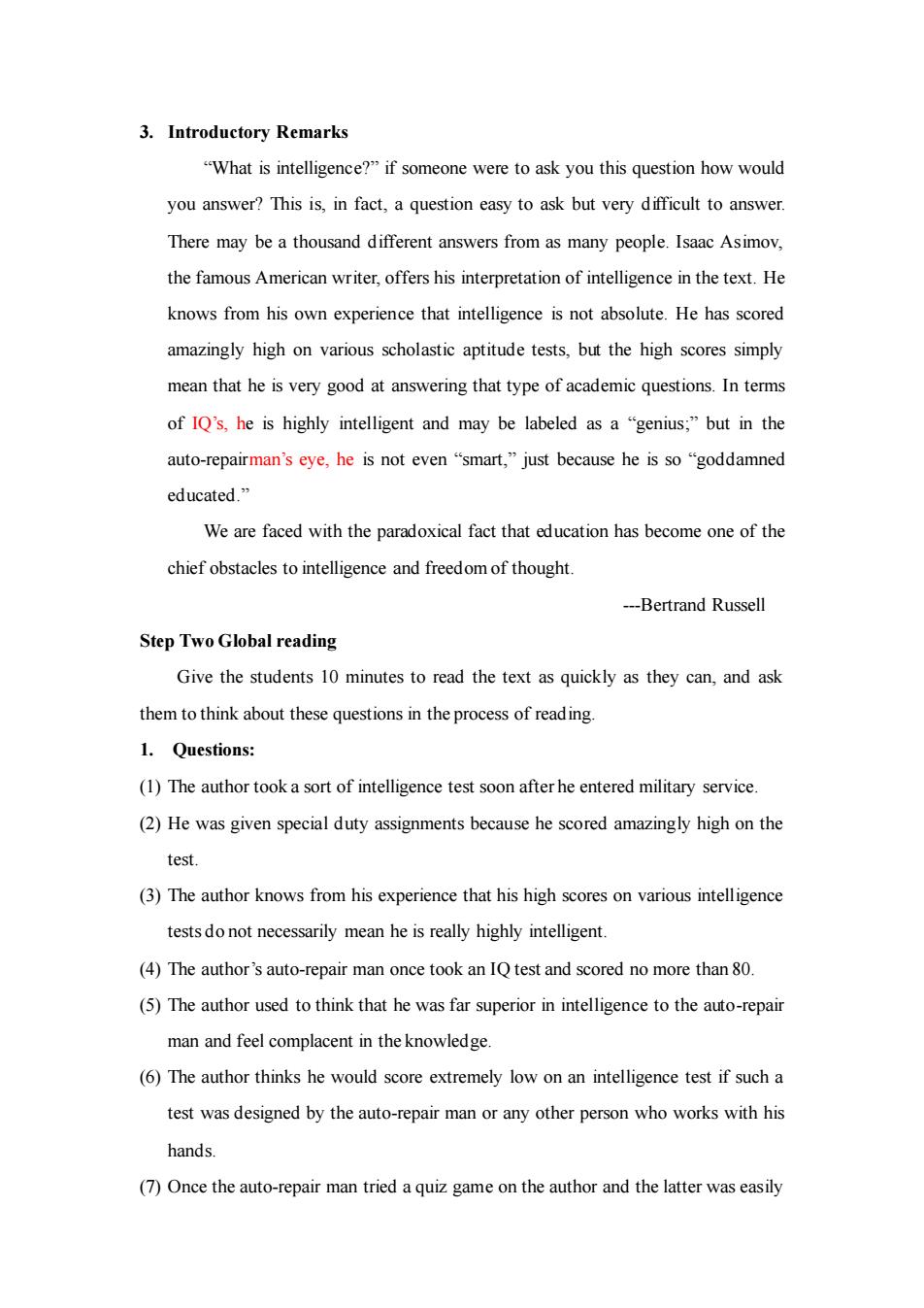
3.Introductory Remarks "What is intelligence?"if someone were to ask you this question how would you answer?This is,in fact,a question easy to ask but very difficult to answer There may be a thousand different answers from as many people.Isaac Asimov, the famous American writer,offers his interpretation of intelligence in the text.He knows from his own experience that intelligence is not absolute.He has scored amazingly high on various scholastic aptitude tests,but the high scores simply mean that he is very good at answering that type of academic questions.In terms of IQ's,he is highly intelligent and may be labeled as a"genius:"but in the auto-repairman's eye.he is not even"smart,"just because he is so"goddamned educated." We are faced with the paradoxical fact that education has become one of the chief obstacles to intelligence and freedom of thought. --Bertrand Russell Step Two Global reading Give the students 10 minutes to read the text as quickly as they can,and ask them to think about these questions in the process of reading. 1.Questions: (1)The author took a sort of intelligence test soon after he entered military service. (2)He was given special duty assignments because he scored amazingly high on the tes (3)The author knows from his experience that his high scores on various intelligence tests do not necessarily mean he is really highly intelligent. (4)The author's auto-repair man once took an IQ test and scored no more than80. (5)The author used to think that he was far superior in intelligence to the auto-repair man and feel complacent in the knowledge. (6)The author thinks he would score extremely low on an intelligence test if such a test was designed by the auto-repair man or any other person who works with his hands. (7)Once the auto-repair man tried a quiz game on the author and the latter was easily
3. Introductory Remarks “What is intelligence?” if someone were to ask you this question how would you answer? This is, in fact, a question easy to ask but very difficult to answer. There may be a thousand different answers from as many people. Isaac Asimov, the famous American writer, offers his interpretation of intelligence in the text. He knows from his own experience that intelligence is not absolute. He has scored amazingly high on various scholastic aptitude tests, but the high scores simply mean that he is very good at answering that type of academic questions. In terms of IQ’s, he is highly intelligent and may be labeled as a “genius;” but in the auto-repairman’s eye, he is not even “smart,” just because he is so “goddamned educated.” We are faced with the paradoxical fact that education has become one of the chief obstacles to intelligence and freedom of thought. ---Bertrand Russell Step Two Global reading Give the students 10 minutes to read the text as quickly as they can, and ask them to think about these questions in the process of reading. 1. Questions: (1) The author took a sort of intelligence test soon after he entered military service. (2) He was given special duty assignments because he scored amazingly high on the test. (3) The author knows from his experience that his high scores on various intelligence tests do not necessarily mean he is really highly intelligent. (4) The author’s auto-repair man once took an IQ test and scored no more than 80. (5) The author used to think that he was far superior in intelligence to the auto-repair man and feel complacent in the knowledge. (6) The author thinks he would score extremely low on an intelligence test if such a test was designed by the auto-repair man or any other person who works with his hands. (7) Once the auto-repair man tried a quiz game on the author and the latter was easily
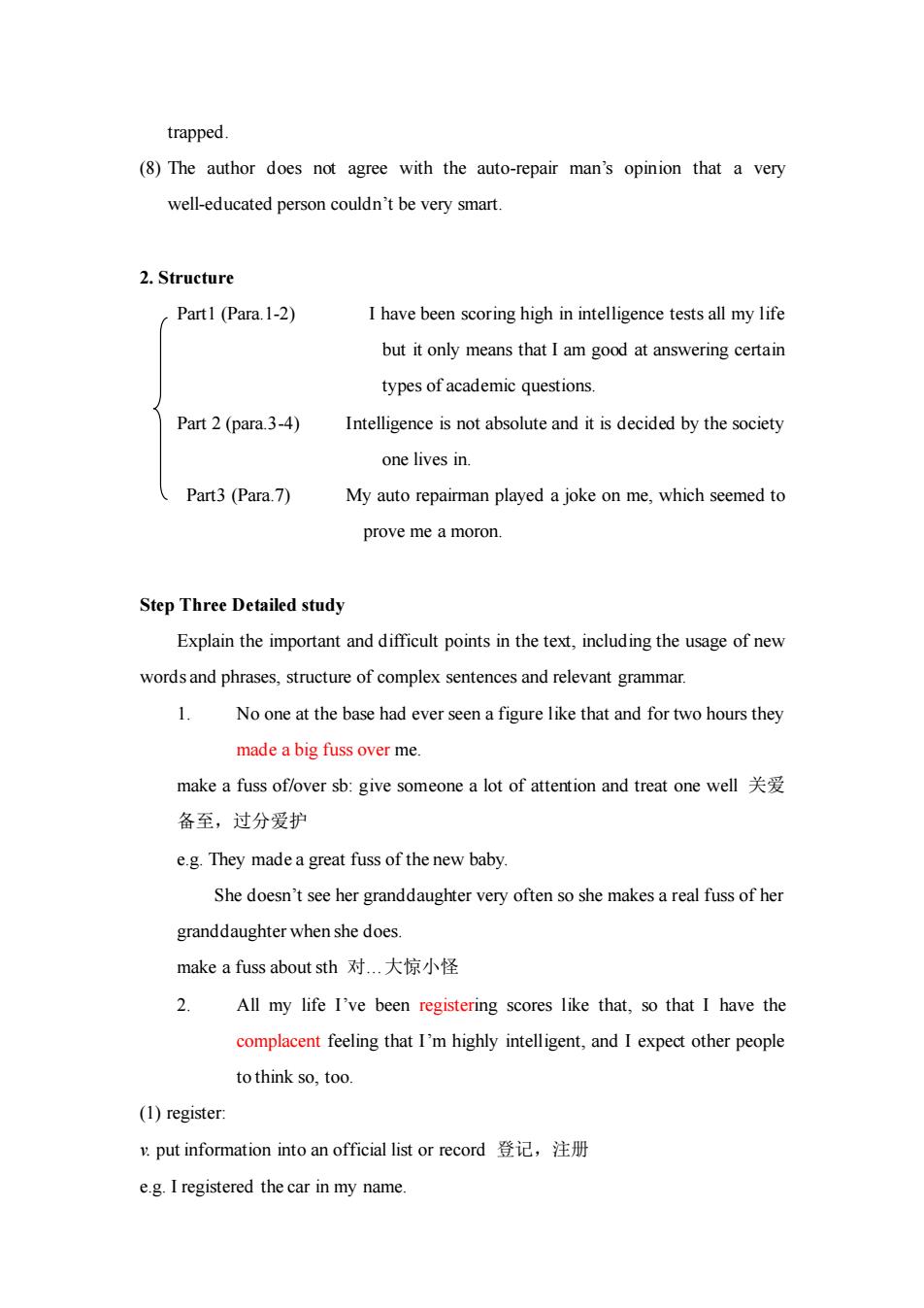
trapped. (8)The author does not agree with the auto-repair man's opinion that a very well-educated person couldn't be very smart. 2.Structure Part1(Para.1-2) I have been scoring high in intelligence tests all my life but it only means that I am good at answering certain types of academic questions Part 2 (para.3-4) Intelligence is not absolute and it is decided by the society one lives in. Part3(Para.7) My auto repairman played a joke on me,which seemed to prove me a moron. Step Three Detailed study Explain the important and difficult points in the text,including the usage of new words and phrases,structure of complex sentences and relevant grammar. 1. No one at the base had ever seen a figure like that and for two hours they made a big fuss over me make a fuss of/over sb:give someone a lot of attention and treat one well 备至,过分爱护 e.g.They made a great fuss of the new baby She doesn't see her granddaughter very often so she makes a real fuss of her granddaughter when she does. make a fuss about sth对..大惊小怪 2. All my life I've been registering scores like that,so that I have the complacent feeling that I'm highly intelligent,and I expect other people to think so,too. (1)register. .put information into an official list or record登记,注册 e.g.I registered the car in my name
trapped. (8) The author does not agree with the auto-repair man’s opinion that a very well-educated person couldn’t be very smart. 2. Structure Part1 (Para.1-2) I have been scoring high in intelligence tests all my life but it only means that I am good at answering certain types of academic questions. Part 2 (para.3-4) Intelligence is not absolute and it is decided by the society one lives in. Part3 (Para.7) My auto repairman played a joke on me, which seemed to prove me a moron. Step Three Detailed study Explain the important and difficult points in the text, including the usage of new words and phrases, structure of complex sentences and relevant grammar. 1. No one at the base had ever seen a figure like that and for two hours they made a big fuss over me. make a fuss of/over sb: give someone a lot of attention and treat one well 关爱 备至,过分爱护 e.g. They made a great fuss of the new baby. She doesn’t see her granddaughter very often so she makes a real fuss of her granddaughter when she does. make a fuss about sth 对…大惊小怪 2. All my life I’ve been registering scores like that, so that I have the complacent feeling that I’m highly intelligent, and I expect other people to think so, too. (1) register: v. put information into an official list or record 登记,注册 e.g. I registered the car in my name

Students have to finish registering for the new course by the end of April. n.an official list or record of names,.items,.etc.登记表,注册簿 e.g.The old man finally found the register of births and deaths (2)complacent:ad.self-satisfied;pleased with oneself自满的,自鸣得意的 e.g.After setting the world record,he became complacent. 3. Actually,though,don't such scores simply mean that I am very good at answering the type of academic questions that are considered worthy of answers by the people who make up the intelligence tests-people with intellectual bents similar to mine? (1)worthy:adj.deserving sth.like respect,admiration or support.etc. e.g.This book is worthy of careful study. Two points in this report are especially worthy of notice. (2)bent:n.special natural skill or interest嗜好,倾向 e.g.She has a scientific bent. He has a natural bent for music. (3)Analyze the structure of the sentence The subject of the sentence is"such scores",the predicate is"mean",and the object is the clause"that I am very good at answering the type of academic questions"."That are considered worthy of answer by the people"is an attributive clause modifying “academic questions'”while“who make up the intelligence tests'”is another attributive clause modifying the word"people' (4)Translate the sentence into Chinese 然而,实际上,难道这类分数不是仅仅意味着我很善于回答那些编制智力测验的 人们一智力爱好跟我类似的人们一认为值得回答的那类学究式的问题 吗? 4. For instance,I had an auto repairman once,who,on these intelligence tests,could not possibly have scored more than 80,by my estimate. (1)Paraphrase the sentence For example,once I had an auto repairman.I suppose that he probably could not achieve a score of more than 80 if he took these intelligence tests
Students have to finish registering for the new course by the end of April. n. an official list or record of names, items, etc. 登记表,注册簿 e.g. The old man finally found the register of births and deaths. (2) complacent: adj. self-satisfied; pleased with oneself 自满的,自鸣得意的 e.g. After setting the world record, he became complacent. 3. Actually, though, don’t such scores simply mean that I am very good at answering the type of academic questions that are considered worthy of answers by the people who make up the intelligence tests — people with intellectual bentssimilar to mine? (1) worthy: adj. deserving sth. like respect, admiration or support, etc. 值得的 e.g. This book is worthy of careful study. Two points in this report are especially worthy of notice. (2) bent: n. special natural skill or interest 嗜好,倾向 e.g. She has a scientific bent. He has a natural bent for music. (3) Analyze the structure of the sentence The subject of the sentence is “such scores”, the predicate is “mean”, and the object is the clause “that I am very good at answering the type of academic questions”. “That are considered worthy of answer by the people” is an attributive clause modifying “academic questions” while “who make up the intelligence tests” is another attributive clause modifying the word “people”. (4)Translate the sentence into Chinese 然而,实际上,难道这类分数不是仅仅意味着我很善于回答那些编制智力测验的 人们 —— 智力爱好跟我类似的人们 —— 认为值得回答的那类学究式的问题 吗? 4. For instance, I had an auto repairman once, who, on these intelligence tests, could not possibly have scored more than 80, by my estimate. (1) Paraphrase the sentence For example, once I had an auto repairman. I suppose that he probably could not achieve a score of more than 80 if he took these intelligence tests
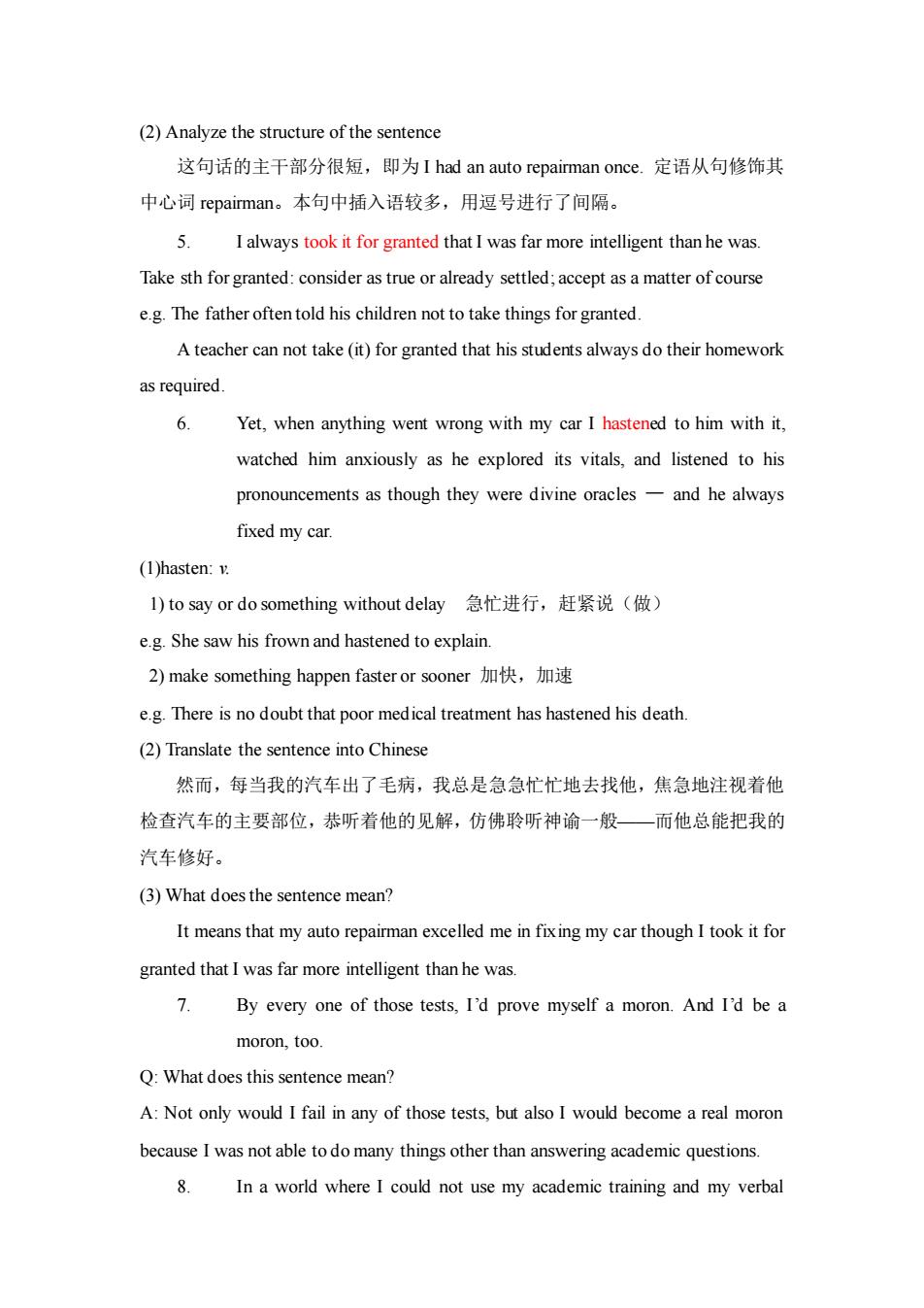
(2)Analyze the structure of the sentence 这句话的主干部分很短,即为I had an auto repairman once.定语从句修饰其 中心词repairman。本句中插入语较多,用逗号进行了间隔。 5. I always took it for granted that I was far more intelligent than he was. Take sth for granted:consider as true or already settled;accept as a matter of course e.g.The father often told his children not to take things for granted. A teacher can not take(it)for granted that his students always do their homework as required 6.Yet,when anything went wrong with my car I hastened to him with it, watched him anxiously as he explored its vitals,and listened to his pronouncements as though they were divine oracles-and he always fixed my car. (1hasten:v. I)to say or do something without delay急忙进行,赶紧说(做) e.g.She saw his frown and hastened to explain. 2)make something happen faster or sooner加快,加速 e.g.There is no doubt that poor medical treatment has hastened his death. (2)Translate the sentence into Chinese 然而,每当我的汽车出了毛病,我总是急急忙忙地去找他,焦急地注视着他 检查汽车的主要部位,恭听着他的见解,仿佛聆听神谕一般—而他总能把我的 汽车修好。 (3)What does the sentence mean? It means that my auto repairman excelled me in fixing my car though I took it for granted that I was far more intelligent than he was 7 By every one of those tests,I'd prove myself a moron.And I'd be a moron,too. Q:What does this sentence mean? A:Not only would I fail in any of those tests,but also I would become a real moron because I was not able to do many things other than answering academic questions. 8. In a world where I could not use my academic training and my verbal
(2) Analyze the structure of the sentence 这句话的主干部分很短,即为 I had an auto repairman once. 定语从句修饰其 中心词 repairman。本句中插入语较多,用逗号进行了间隔。 5. I always took it for granted that I was far more intelligent than he was. Take sth for granted: consider as true or already settled; accept as a matter of course e.g. The father often told his children not to take things for granted. A teacher can not take (it) for granted that his students always do their homework as required. 6. Yet, when anything went wrong with my car I hastened to him with it, watched him anxiously as he explored its vitals, and listened to his pronouncements as though they were divine oracles — and he always fixed my car. (1)hasten: v. 1) to say or do something without delay 急忙进行,赶紧说(做) e.g. She saw his frown and hastened to explain. 2) make something happen faster or sooner 加快,加速 e.g. There is no doubt that poor medical treatment has hastened his death. (2) Translate the sentence into Chinese 然而,每当我的汽车出了毛病,我总是急急忙忙地去找他,焦急地注视着他 检查汽车的主要部位,恭听着他的见解,仿佛聆听神谕一般——而他总能把我的 汽车修好。 (3) What does the sentence mean? It means that my auto repairman excelled me in fixing my car though I took it for granted that I was far more intelligent than he was. 7. By every one of those tests, I’d prove myself a moron. And I’d be a moron, too. Q: What does this sentence mean? A: Not only would I fail in any of those tests, but also I would become a real moron because I was not able to do many things other than answering academic questions. 8. In a world where I could not use my academic training and my verbal

talents but had to do something intricate or hard,working with my hands. I would do poorly (1)intricate:adj.containing many small parts or details that all work or fit together 错综复杂的 e.g.There are intricate patterns on this cloth. The watch mechanism is extremely intricate and very difficult to repair. (2)What do the sentences mean? I could not fulfill any task successfully when I had to do something complicated or hard with my hands rather than with my school education and verbal gift. 9 Its numerical evaluation is determined by a small subsection of that society which has managed to foist itself on the rest of us as an arbiter of such matters. (1)foist on:try to get someone to accept something worthless or unwanted e.g.Stores should not foist defective goodson customers. I'm sorry all this has been foisted on you. (2)What can we infer from the sentence? The author believed that only a small group of people in society determined what intelligence was and forced all the others to accept their ideas (3)Translate the sentence into Chinese 它的数值是由那个社会中的一小部分人决定的,他们作为这类事情的仲裁人己设 法把他们的意志强加在我们身上。 10. Then he said,smugly,"I've been trying that on all my customers today." smugly:adv.too pleased or satisfied about something you have achieved or something you know e.g."I own three cars and two boats",he said smugly. 11.And I have an uneasy feeling he had something there. (I)uneasy:ad.anxious,awkward,not easy in mind or body局促的,不安的 e.g.The boy spent an uneasy hour waiting for the news (2)What can we infer from the sentence? To some extent,the author agrees with the auto repairman that too much
talents but had to do something intricate or hard, working with my hands, I would do poorly. (1) intricate: adj. containing many small parts or details that all work or fit together 错综复杂的 e.g. There are intricate patterns on this cloth. The watch mechanism is extremely intricate and very difficult to repair. (2) What do the sentences mean? I could not fulfill any task successfully when I had to do something complicated or hard with my hands rather than with my school education and verbal gift. 9. Its numerical evaluation is determined by a small subsection of that society which has managed to foist itself on the rest of us as an arbiter of such matters. (1) foist on: try to get someone to accept something worthless or unwanted 强加 e.g. Stores should not foist defective goods on customers. I’m sorry all this has been foisted on you. (2) What can we infer from the sentence? The author believed that only a small group of people in society determined what intelligence was and forced all the others to accept their ideas. (3) Translate the sentence into Chinese 它的数值是由那个社会中的一小部分人决定的,他们作为这类事情的仲裁人已设 法把他们的意志强加在我们身上。 10. Then he said, smugly, “I’ve been trying that on all my customers today.” smugly: adv. too pleased or satisfied about something you have achieved or something you know e.g. “I own three cars and two boats”, he said smugly. 11. And I have an uneasy feeling he had something there. (1) uneasy: adj. anxious, awkward, not easy in mind or body 局促的,不安的 e.g. The boy spent an uneasy hour waiting for the news. (2) What can we infer from the sentence? To some extent, the author agrees with the auto repairman that too much
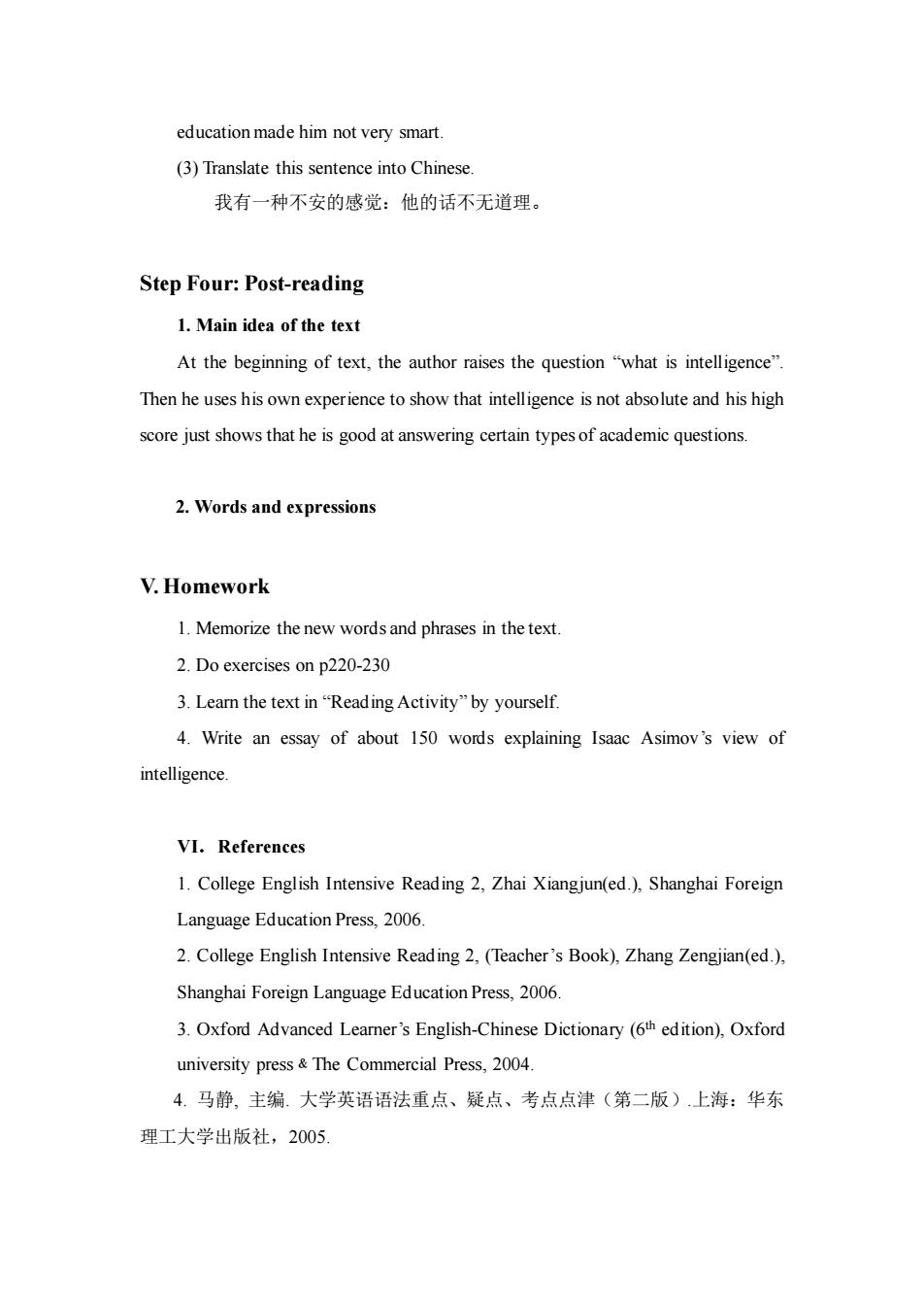
education made him not very smart (3)Translate this sentence into Chinese 我有一种不安的感觉:他的话不无道理。 Step Four:Post-reading 1.Main idea of the text At the beginning of text,the author raises the question "what is intelligence". Then he uses his own experience to show that intelligence is not absolute and his high score just shows that he is good at answering certain types of academic questions. 2.Words and expressions V.Homework 1.Memorize the new words and phrases in the text. 2.Do exercises on p220-230 3.Learn the text in"Reading Activity"by yourself. 4.Write an essay of about 150 words explaining Isaac Asimov's view of intelligence. VI.References 1.College English Intensive Reading 2,Zhai Xiangjun(ed.),Shanghai Foreign Language Education Press,2006 2.College English Intensive Reading 2,(Teacher's Book),Zhang Zengjian(ed.), Shanghai Foreign Language Education Press,2006. 3.Oxford Advanced Learner's English-Chinese Dictionary(6th edition),Oxford university press The Commercial Press,2004. 4.马静,主编.大学英语语法重点、疑点、考点点津(第二版).上海:华东 理工大学出版社,2005
education made him not very smart. (3) Translate this sentence into Chinese. 我有一种不安的感觉:他的话不无道理。 Step Four: Post-reading 1. Main idea of the text At the beginning of text, the author raises the question “what is intelligence”. Then he uses his own experience to show that intelligence is not absolute and his high score just shows that he is good at answering certain types of academic questions. 2. Words and expressions V. Homework 1. Memorize the new words and phrases in the text. 2. Do exercises on p220-230 3. Learn the text in “Reading Activity” by yourself. 4. Write an essay of about 150 words explaining Isaac Asimov’s view of intelligence. VI.References 1. College English Intensive Reading 2, Zhai Xiangjun(ed.), Shanghai Foreign Language Education Press, 2006. 2. College English Intensive Reading 2, (Teacher’s Book), Zhang Zengjian(ed.), Shanghai Foreign Language Education Press, 2006. 3. Oxford Advanced Learner’s English-Chinese Dictionary (6th edition), Oxford university press﹠The Commercial Press, 2004. 4. 马静, 主编. 大学英语语法重点、疑点、考点点津(第二版).上海:华东 理工大学出版社,2005